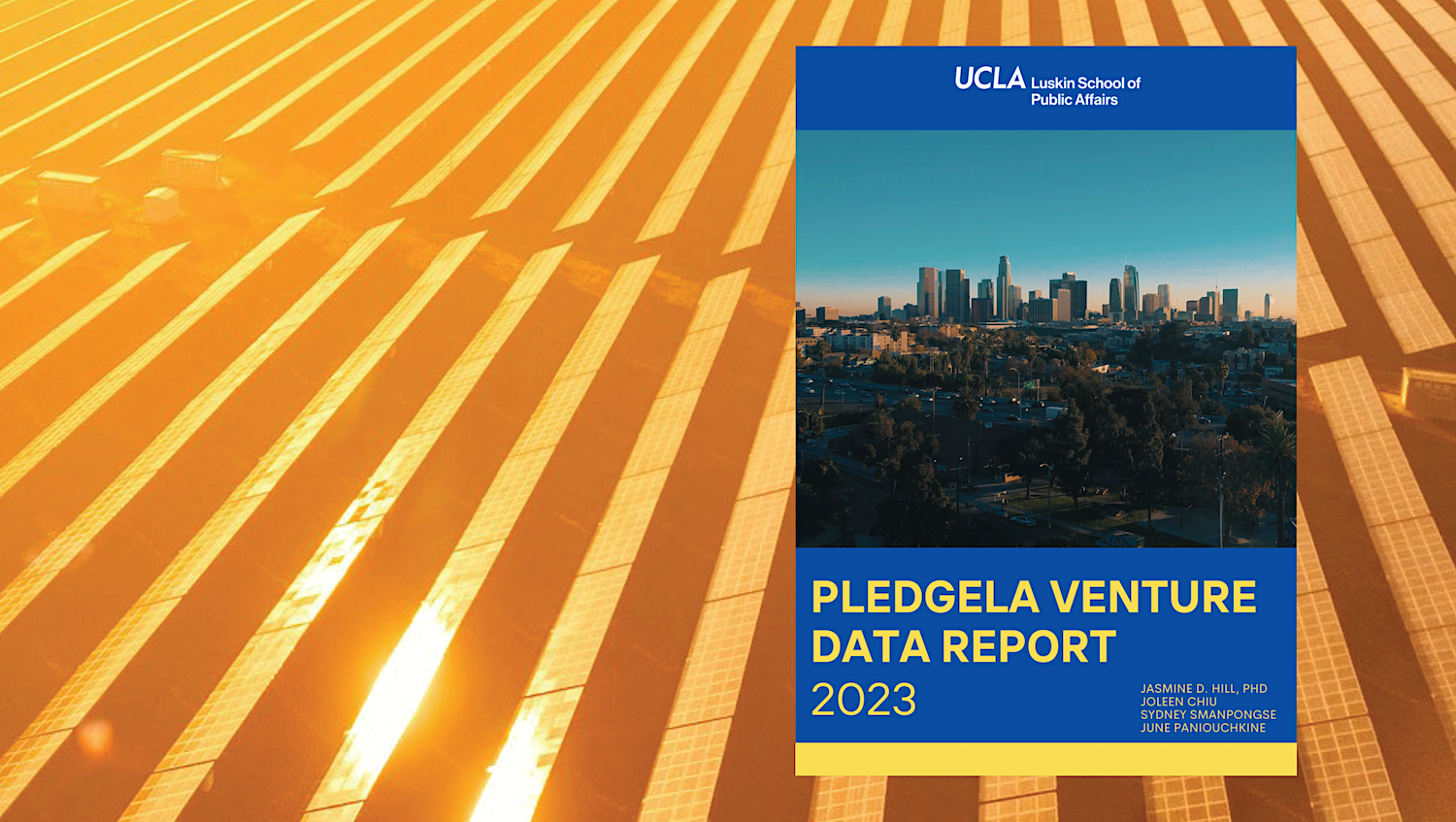UCLA’s New Latino Data Hub: A Catalyst for Change
The Latino population in the United States has long been viewed as monolithic, with little acknowledgement of its rich tapestry of identities and experiences, and this mischaracterization has persisted despite tremendous growth in both the numbers and diversity of Latino communities in recent years. Because these communities — from Mexican and Puerto Rican to Venezuelan and Panamanian — are impacted by social, political and economic factors in different ways, the “one-dimensional” stereotype has obscured the significant barriers many groups face in accessing opportunities and achieving political representation and social mobility. Now, there is a new resource to help foster a better understanding of these diverse populations: the UCLA Latino Policy and Politics Institute’s Latino Data Hub, a digital platform offering a broad range of reliable and actionable data on Latino communities across the country. Available in both English and Spanish, the free digital tool offers customizable visualizations in key areas such as family wellness, access to health insurance, access to education, employment and income. The data is available at the national, state and county level and provides granular information in areas such as nativity and citizenship, sex, gender, age, race, ethnicity, socioeconomic status, education level and employment. The Latino Data Hub, developed with funding from Casey Family Programs and the W. K. Kellogg Foundation, will “empower advocates, policymakers, community leaders, philanthropic organizations, researchers, media and other change makers to develop data-driven solutions to create stronger communities,” said Rodrigo Dominguez-Villegas, research director of UCLA LPPI. — Alberto Lammers
Essays Capture Legacy of L.A. Historian Mike Davis
The journal Human Geography published a collection of essays curated by UCLA Luskin Urban Planning to honor author, activist and Los Angeles historian Mike Davis. Ananya Roy, the professor of urban planning, social welfare and geography who directs the UCLA Luskin Institute on Inequality and Democracy, wrote an introduction to the collection, which arose from a convening of L.A. scholars at the Luskin School a few months after Davis’ death in October 2022. As Roy writes, “the gathering continued late into the evening as scholars of different generations, from distinguished professors to undergraduate students, celebrated all that we have each, and collectively, learned from Mike Davis.” The essay collection emphasizes that while Davis “saw and found struggle in the many terrains of catastrophe that he analyzed so prophetically,” he was neither a pessimist nor a defeatist. Roy’s essay “A political autopsy of Liberal Los Angeles” also appears in the collection, along with “Planetarity and environmentalisms: the invention of new environmental histories from the Ecology of Fear to Victorian Holocausts” by urban planning professor Susanna Hecht; “The poet of L.A.’s urban” by urban planning professor Michael Storper; “Old school socialist” by UCLA history professor Robin D.G. Kelley; “To Los Angeles: United in Grief, United in Struggle” by post-doctoral scholar Deshonay Dozier; and “Lessons in accumulated rage and rebellious scholarship” by USC professor Juan De Lara.
Advanced High School Math Courses Pave Way for College Success, Report Finds
High school students interested in pursuing a career in STEM should have access to calculus classes in 12th grade, according to a new report by the Los Angeles Education Research Institute (LAERI) at UCLA. The study analyzed college performance among more than 17,000 Los Angeles Unified School District graduates who attended a California community college or Cal State Northridge. It found that students who took math in 12th grade completed more college-level math credits compared to academically similar students who did not take math in 12th grade. It also found that students who took calculus in 12th grade completed more college-level math credits than those who took statistics. The findings underscore the importance of providing access to advanced mathematics courses in high school, which will particularly benefit students interested in pursuing studies in science, technology, engineering and math, said Meredith Phillips, associate professor of public policy and co-founder of LAERI. An earlier report from the institute found that taking 12th grade math improves students’ chances of enrolling and continuing in higher education; the new study assesses student performance in the college environment. The research was funded by the nonprofit College Futures Foundation and conducted by scholars from UCLA, USC, Reed College and Loyola Marymount University. LAERI, based at UCLA Luskin, has collaborated with L.A. Unified for more than 10 years to produce research that district decision-makers and educators use to improve educational quality and equity in Los Angeles.
Read the LAERI reports:
Twelfth Grade Math and College Access
Twelfth Grade Math and College Success
Cooper Joins State Task Force to Reform Child Welfare Policies
UCLA Luskin Social Welfare faculty member Khush Cooper has been named to a new state task force that will develop recommendations for reforming California’s policies mandating the reporting of suspected child abuse or neglect. Research shows that only a small percentage of these reports are confirmed as maltreatment, and that Black, Latino and Indigenous children and families in California are much more likely to be reported and become involved in the child welfare system. The task force was launched to guide the state as it transitions away from a system focused on reporting families to government agencies, and instead prioritizes child safety and family unity by providing robust, culturally appropriate community supports. Working under the auspices of the California Child Welfare Council, the task force will consider several factors, including narrowing the legal definition of “neglect,” reducing racial and socioeconomic bias in mandated reporting, and determining the best way to provide concrete support to families in need. It will produce a report including actionable steps by June 2024. Cooper earned her master and doctorate of social welfare at UCLA Luskin. In addition to her teaching and research, she serves as a consultant to public and private child welfare organizations in areas that include foster care, LGBTQ+ youth and residential treatment.
UCLA, Hebrew University Receive $1.3 Million in Grants for Collaboration to Deter School Violence
Grants from The Rosalinde and Arthur Gilbert Foundation and an anonymous donor will support a new partnership between UCLA and the Hebrew University of Jerusalem focused on developing school violence prevention strategies that ensure that campuses are safe and welcoming places for children worldwide. The UCLA-HU Collaboration for Safe Schools is a $1.3 million, two-year pilot program connecting university students, scholars and practitioners globally and across disciplines to share research and insights related to the complex underlying causes of school violence. Through exchange programs and conferences held on each campus, the partnership will bring top U.S. and Israeli scholars together with K-12 educators, administrators and social workers; policymakers and experts in law and criminology; and graduate and undergraduate students focused on fields related to social education. The first conference, to be held at the Hebrew University in Jerusalem, will focus on how to ensure safety at schools in areas that are experiencing extreme strife at the political and social levels. Recruitment of partnering research teams at Hebrew University and UCLA will begin in the fall of 2023. The program will operate under the leadership of two internationally recognized experts in school safety: Ron Avi Astor, UCLA professor of social welfare and education, has worked with thousands of schools to reduce victimization of students in a career spanning three decades. Mona Khoury-Kassabri, chair of Hebrew University’s school of social work and social welfare, is also the university’s vice president of strategy and diversity.
Read the January 2023 Luskin Forum story about Astor’s work
Advancing Climate Policy in an Era of Deeply Partisan Politics
In a deeply polarized political environment, Americans are more divided on climate change than ever before. Yet three recent developments could advance climate policy, despite partisan politics, according to a new article in the journal Political Science & Politics co-authored by UCLA Luskin Center for Innovation faculty director Megan Mullin and Patrick J. Egan of New York University:
- Partisan cohesion and Democratic initiative. The Republican and Democratic parties have become more unified internally. While Republicans are less concerned about climate change than ever before, growing cohesion among Democrats, both among elected officials and members of the public, has elevated climate change as a party priority and increased their willingness to take electoral risks to address it.
- Clean-energy expansion in Republican states. Even though decision-makers in Republican-led states have backpedaled on support for clean energy, those states are leaders in clean-energy production. Nearly 40% of U.S. renewable energy is situated in the Republican-led states of Iowa, Kansas, Oklahoma and Texas, suggesting that markets can overcome politics in the transition to a clean-energy economy.
- Partisan distribution of climate impacts. Heavily Republican areas may suffer disproportionately from the worst effects of climate change. Mullin and Egan bring together maps of climate risk with county voting records to show that Republican counties have higher percentages of properties at severe or extreme risk from flooding and fire over the next 30 years. This may inspire partisan voters to demand political action by their elected officials.
Read the full story, and find related research on the Center for Innovation’s Climate Adaptation and Resilience webpage.
Report Finds Equity Gaps in L.A. Tech Sector
A new study led by UCLA Luskin Public Policy faculty member Jasmine Hill analyzes the diversity of 2022 venture capital investments in Greater Los Angeles. Released today, the report assesses investments made by 75 venture capital firms that are members of the PledgeLA initiative, which prioritizes equitable access to capital. Hill’s research team determined that less than one-third of the firms’ investments in 2022 went to companies led by women, Black or Latino founders, and these companies received only 4.6% ($6.4 billion) of the $139 billion invested. However, venture capital firms led by underrepresented minorities and those with a diversity thesis were almost twice as likely to back Latino and women founders and four times more likely to invest in Black founders. “Los Angeles has long surpassed the portfolio diversity typical of venture capital on the national level,” Hill said, “but there is a considerable journey ahead before PledgeLA firms reflect the region’s diversity.” The research team, which used a cross-section of data to create a holistic view of the Los Angeles tech ecosystem, included master of public policy student Sydney Smanpongse and public affairs major June Paniouchkine from the Luskin School and UCLA master of economics student Joleen Chiu. The report was commissioned by PledgeLA, launched by the Annenberg Foundation and the Office of the Mayor of Los Angeles to measurably increase diversity, equity and community engagement in the tech sector. In June, PledgeLA announced a new regional goal called “50 in 5,” which seeks to drive 50% of all venture investments to companies led by women, Black and Latino founders by 2028.
Read the PledgeLA news release







